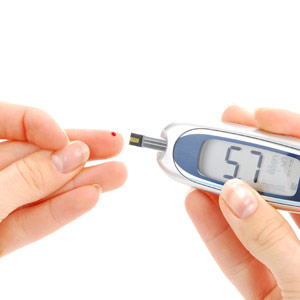
Eventually, people with diabetes won't need to prick their fingers multiple times a day to check their blood sugar levels, if researchers have their way.
Sylvia Daunert and her lab team at the University of Miami in Florida are reporting significant progress toward the development of sensors that would continuously monitor blood sugar levels without needing blood samples. The results could even be displayed on a mobile device such as a cell phone.
Today, to keep their blood sugar in a safe range, diabetics must monitor those levels with a device that pricks the skin to draw a blood sample for testing.
Read: Implantable sensor monitors blood sugar levels in pigs
Benefits of the sensors
There are two good reasons to improve that method, the researchers say. First, and most obvious, is that a test without drawing blood would be more comfortable.
The other is that a biosensor beneath the skin could give continuous updates, rather than spot checks of blood samples. That kind of information would be particularly helpful for monitoring people with diabetes who are critically ill, or undergoing surgery, the research team points out in the journal ACS Chemical Biology.
"Currently there are no devices that are able to monitor glucose continuously for long periods of time. Our designer glucose sensing peptides will allow (us) to achieve continuous monitoring," Daunert told Reuters Health by email.
How the sensor works
To build a sensor, Daunert and her team modified a protein to allow it to bind very tightly to glucose. They also made the protein fluorescent and gave it the ability to give off a signal when it binds to glucose: the fluorescence weakens, and the protein darkens.
That signal - the intensity of the fluorescence - "can be measured by a portable meter and the response wirelessly transmitted to a smart phone or the cloud," said John Pickup in email to Reuters Health. Pickup, a professor of diabetes and metabolism at King's College London School of Medicine, was not involved in the research.
Today, diabetics can wear insulin pumps, which deliver preset doses of insulin to the body through catheters placed under the skin - but those devices still can't monitor blood sugar levels.
Read: New study indicates success of insulin pumps with blood sugar sensors
The future of blood glucose monitoring
Daunert envisions the development of implantable catheters that could sense the changes in the proteins as they bind to glucose. These sensors may even be tied to an insulin pump, so the pump could automatically adjust the amount of insulin it's releasing.
How long until these devices are available? There are still obstacles to overcome, and no particular method is in line yet for incorporation into a commercial device. But the researchers are optimistic.
"First, we need to perform in vivo studies with animals, then humans and then seek (US Food and Drug Administration) device approval. Overall, to be on the safe side I would estimate five years until the catheter biosensors are on the shelf," Daunert says.
"Whatever the details of methods used for protein engineering, the papers now appearing on GBP (glucose-binding protein) as a glucose sensor highlight exciting new opportunities for monitoring glucose in diabetes by fluorescence," Pickup says.
Read more:
New model predicts complications in type 1 diabetics
Pistachios may reduce diabetes risk
Low birth weight may increase diabetes risk




 Publications
Publications
 Partners
Partners















